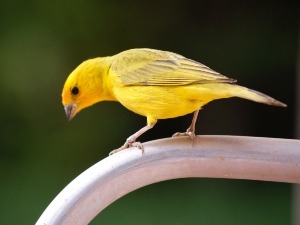
Your canary is likely very fond of you, and you are likely very fond of it.
If you love your bird you likely want it to live a long, healthy, and happy life, unfortunately, illnesses can shorten your birds life.
If your bird is twitching its head then you may think that the bird is sick. This article looks into why your canary is twitching its head.
Table of Contents
Canary twitching head:
Twitching is an involuntary action that humans and animals, like canaries, do.
There are a variety of reasons why humans will twitch. Here is why your canaries head may be twitching:
Seizure:
If your canaries head is twitching then this likely means that the bird is suffering from a seizure.
Seizures not only affect humans, they can affect birds too, and they are fairly common in birds.
Not only can a seizure affect your canary it can also affect other birds such as budgies, cockatiels, amazon parrots, finches, lovebirds, and African grey parrots to name a few.
Seizures cause involuntary responses in the bird’s body, this can be in the bird’s legs, wings, or head, as can be seen in your canary.
Why this happens:
Your canaries’ seizures may have been caused by a variety of things including heatstroke, trauma from knocking into things, tumors, bacterial, viral, or fungal infections, or, the ingestion of toxins.
Symptoms of seizures:
There are a variety of signs that indicate that your bird is suffering a seizure in addition to the head twitching.
Other signs of a seizure in your bird include:
- The inability to perch
- Twitching of the legs
- Uncontrolled wing flapping
- A brief loss of consciousness
- A stiffening of the body
What to do:
Taking your canary to the vet, once you see signs of a seizure, is the recommended course of action.
Take your bird to the vet as quickly as you can.
If you can’t immediately get your bird to the vet then you’d need to keep the bird isolated somewhere comfortable.
The seizures may cause the bird to start falling over.
For this reason, it is recommended that you add soft bedding to the bottom of your bird’s cage in case the bird falls.
Make sure that the area that you keep the bird in is warm but not too warm, is quiet, and the lights in the room are dim.
Give your bird nutritious food while it waits for the vet visit and give the bird water, but not in a dish deep enough for the bird to drown in.
Your vet will be able to examine the bird and run tests on it as well as give your bird medication to stop the seizures.
Treatment:
Your vet will not only give your bird medications that will stop the seizures, but they will also give medications to treat the cause of the seizures.
The medication that will be given will be chosen after the vet runs tests on the bird and examines the bird.
Keep the bird in the same padded cage once you take it home and continue to give the bird the medications that your vet prescribed.
If you enjoyed this article then you may also be interested in other bird related articles. Here are some articles that you may be interested in: Stress Seizures In Birds, Bird Died After Bath, Budgie Twitching Leg, Cockatiel leg twitching, Why Does My Cockatiel Love My Feet?, Why Does My Cockatiel Sing To My Feet?, How Do I Know If My Budgies Beak Is Too Long?, Why Is My Budgies Head Bleeding?, What To Do If Budgie Beak Is Too Long?

